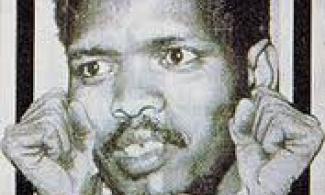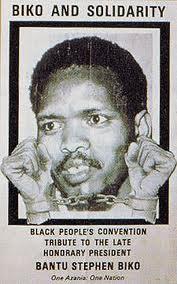

The Black Consciousness activist would have been 65 this week but his life was cut short at the age of 30 when he was murdered by apartheid-era police while in detention. Born on Dec. 18, 1946, he died on Sept. 12, 1977 in Pretoria.
By 1972, Biko had become one of the founders and later the first President of the Black Peoples Convention which retaliated against the Apartheid government using “black communism”, land restitution, and guerrilla warfare.
In spite of government repression, Biko and the Black Consciousness Movement played a significant role in organizing the protests which culminated in the Soweto Uprising of June 16, 1976.
The Truth and Reconciliation Commission, created after the end of minority rule and the apartheid system, reported in 1997 that five former members of the South African security forces who had admitted to killing Biko were applying for amnesty. Their application was rejected.
Nkosinathi BIko, CEO of the Steve Biko foundation, said: “Black Consciousness taught people about a positive sense of self and then tried to link that positive sense of self to an emancipation program. We need programs that will rekindle the consciousness of the citizenry in this country. We need a reawakening of the national consciousness.”
 Three African Countries To Top World Growth Rates
Three African Countries To Top World Growth Rates
Dec. 20 (GIN) – A Harvard study has concluded that the lion economies of Kenya, Uganda and Tanzania will be leading all other world economies, with annual rates exceeding 6 percent, by the year 2020.
The U.S. by comparison saw a 2% rate of growth in the third quarter of 2011.
Other economies in the East African region at the top of the list include: Madagascar, Malawi, Zambia, Ethiopia and Mozambique. Rwanda, among the world’s 10 fastest growing economies since the early 2000s, could not be included in the study due to the lack of reliable data.
On a GDP per capita basis, China and India are still projected to be the fastest growing economies in the world; East Africa though tops the list in terms of GDP growth.
The forecasts appear in a newly-published study called “The Atlas of Economic Complexity - Mapping Paths to Prosperity” by researchers at the Center for International Development at Harvard University.
“Just like China and Taiwan, East African countries are not really “poor” from a capabilities perspective,” observed Dimitri Stoelinga of Laterite, a consulting firm based in Rwanda. “Twenty-five years ago, China and Taiwan had the capabilities to develop the diverse range of products that they produce today; it is these same capabilities that led them to their current income levels. .. “
Scholarly predictions of Africa’s growth potential can be found at web.MIT.edu/sloanafrica/Africa.html
.jpg) East Africa To Take New Shape After Inevitable Resource Wars
East Africa To Take New Shape After Inevitable Resource Wars
Dec. 20 (GIN) – The coming struggles over water, land and other resources in East African will produce a new map of East Africa. Countries will be born and others extinguished, experts say.
“The wider East African region is special – and even notorious – in Africa. In the past 18 years it has produced more new or wanna-be-new nations than all of Africa combined,” writes Charles Onyango-Obbo, executive editor of the Nation Media group in Kenya.
“Virtually all the countries in the region, except Tanzania, face serious water stress in the next few years. Kenya is the most stressed,” writes Onyango-Obbo, “with only a quarter of what hydrologists consider the basic per person minimum.
“The most successful countries will be the water-rich ones or those smart at environmental management: In this scenario, Rwanda and a resurgent DR Congo could eat up Uganda; and Tanzania will become the regional superpower, swallowing most of Kenya. South Sudan will take a chunk of Kenyan and Ethiopian territory.”
“The Democratic Republic of Congo is the resource king … with $24 trillion worth of untapped mineral deposits, equivalent to the GDP of Europe and the U.S. combined. It has the world’s largest reserves of cobalt and much of the world’s diamonds, gold and copper. This makes the DRC potentially the richest country in the world.”
In the coming years, predicts Onyango-Obbo, Tanzania will ingest Burundi, Uganda and DRC would eat Rwanda for lunch, and Kenya would all but disappear, being carved up between Uganda, Tanzania, and South Sudan. Ethiopia would, largely, remain intact.” w/pix of C. Onyango-Obbo
.jpg) Cotton Picked By children Found in 'Fair Trade' Garments, Reporter Finds
Cotton Picked By children Found in 'Fair Trade' Garments, Reporter Finds
Dec. 20 (GIN) – Sexy garments made for Victoria’s Secret claim to include “fair trade” fibers from cotton farms in Burkina Faso.
“Good for women,” reads a booklet accompanying a Victoria’s Secret ‘fair trade’ thong covered with blue and lavender daisies. “Good for the children who depend on them.”
But an investigative reporter for Bloomburg News found children, age 13 and under, doing backbreaking work including a 12 year old girl digging rows for cotton by hand. The farm was the length of four football fields.
In most developing countries, this work would be done by an animal and a plow, but in Burkina Faso, farmers are so poor it's easier and cheaper to use orphans.
"It's really extraordinary. The work goes on for six or seven months, all the way through the harvest," Bloomberg reporter Cam Simpson said.
Organic farms make greater demands on young workers. Children must weed the fields by hand, haul manure compost to each of the plants and pluck worms out of the cotton, and then smash them with their foot. With over 7000 fair trade farmers in 2008, investigators found children who were abused or malnourished, illegally kept out of school, and overworked.
Cotton is produced with child or forced labor in more countries than any other commodity except gold in the global supply chain, according to the U.S. Labor Department. The West African nation of Burkina Faso has been repeatedly cited for the worst forms of child labor.
Victoria's Secret's parent company has pledged an investigation. w/pix of Clarissa, child laborer
 Two 'Presidents' Vie For Control Of The Democratic Republic Of Congo
Two 'Presidents' Vie For Control Of The Democratic Republic Of Congo
Dec. 20 (GIN) – As tanks circled the capital city of Kinshasa, Joseph Kabila was sworn in as president for a second term in office.
His victory in the November poll was upheld by the nation’s Supreme Court, but widely condemned as “flawed” by western countries including the U.S. Zimbabwe’s Pres. Robert Mugabe was the only foreign leader to attend the swearing-in ceremony.
Kabila’s rival, Etienne Tshisekedi, dismissed the vote results and in a flashback to a similar crisis in the Ivory Coast, he claimed to be the real winner and announced an inauguration ceremony for himself later this week.
For Tshisekedi, age 78, this might be the last bite at the apple for political office in a long career that included a decade of service as justice minister under reviled leader Mobutu Sese Seko, and then as a critic of Mobutu and leader of a new opposition party. According to the book “The Assassination of Lumumba,” Mr Tshisekedi opposed the popular first prime minister and pioneer of African Unity, Patrice Lumumba, and took part in the negotiations about his fate.
“Every day of my life I've dreamt of becoming president of the republic," he said in a July interview. "Now the moment has come for that dream to become a reality."